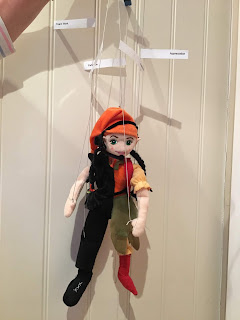As per the norm, a small group of us trundled onto the University campus to have a session with Helen and Adesola. This small yet quaint group consisted of two Module 2 students, two Module 3 students (myself and Eleanor) And Michael a Module 1 MA student.
The day began by each of describing what it is we are handing in at the end of our terms/current module.
For myself and Eleanor it was our Inquiry - our Critical Review paper. I described mine as my journey of realising the skills from tech can be used in performing.
Critical review is a reflection how you did it (your inquiry), what you expected to happen, what did happen and how you put it into your practice.
A huge portion of the day was spent in discussion, so I've just written some brief notes on things I found important:
- We need to make sure there is clarity within our critical review/inquiry. What is being asked? Am I addressing it? Keep coming back to the question.
- Interviews are a stimulus for ideas. They're qualitative not quantitive.
- Write about what I have learnt from this experience (Inquiry)
- When the handbook or reader talks of possible implications my inquiry might have on my community of practice, I mentioned how to me it always seemed to mean sharing my knowledge and what I have learnt to those in my community of practice, just putting the information I have discovered out there, is what benefits my community of practice. Helen added it gives a better understanding of the framework of your industry.
- It was crazy to see how everything works together right from Module 1 all the way through to Module 3. You may not see it now but
hang on in there, it will all make sense. Like a good jigsaw puzzle, all the pieces fit together and create one big image - you and your practice.
- Analysis is putting meaning (knowledge) into information
We ended the session by creating a glossary of terms that confused or alluded us all the way from Module 1 through to Module 3. Part of me (most of me) wishes this was created earlier during my time on this course because it would have saved a lot of time, worry and stress surrounding understanding. However, now it is there and has the voices of students from all modules behind it (thanks to this campus session) hopefully it'll make someones life that little bit easier.c
I would also like to take a quick moment to preach how valuable the campus sessions are. It's so important to use the human contact hours to pitch ideas and thoughts whilst getting a real time response. I know time, work and distance can take that chance away from us most of the time, but even the odd one will make all the difference. Well, it has for me at least.
Anyway, back to writing my Critical Review, but first, a brew. Cheers.









